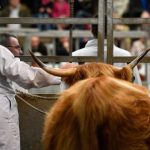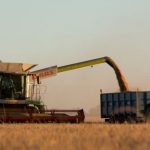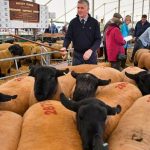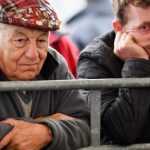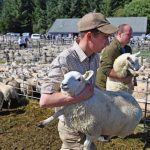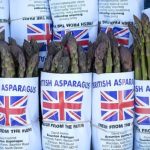After Brexit: What happens next for the UK’s farmers?
 By Jamie Robertson Business reporter, From BBC News
By Jamie Robertson Business reporter, From BBC News
Of all UK industries, farming could lose or gain the most from Brexit.
At worst Brexit could devastate the farming sector; on average 60% of farm incomes come in the form of EU subsidies.
The report by Informa Agribusiness Intelligence estimates that without subsidies 90% of farms would collapse and land prices would crash.
So far no one has said the subsidies will be taken away, or even that they will shrink.
Indeed, the government has promised to match them up until 2020.
But beyond that it has promised nothing.
This week has seen a flurry of activity as the farming industry tries to grapple with what comes next.
MPs from the Environmental Audit Committee warned on Tuesday of the dangers of Brexit to farming. Its report, the Future of the Natural Environment after the EU Referendum, says:
Leaving the Common Agricultural Policy will threaten the viability of some farms
Trade agreements which impose taxes on UK farm exports will threaten farm and food business incomes
New trading relationships with states outside the EU could lead to increased competition from countries with lower food, animal welfare and environmental standards
Farming conference
Meanwhile farmers gathered at the Oxford Farming Conference (OFC) this week to listen to the Environment Secretary Andrea Leadsom, but there were precious few details on what would happen once EU subsidies go.
“We will be consulting in the near future on exactly the shape of future farm and agriculture support,” said Ms Leadsom. “I will be committed to supporting farming in both the short and longer term.”
Also at the OFC was George Eustice, Minister of State at the Department for Environment, Food and Rural Affairs (DEFRA, who was a little more detailed.
“I want to support agriculture to where it becomes more profitable, more vibrant, so we see expanding food production in this country, where we are supporting farmers to deliver eco-system services.
“So that rather than telling them ‘here’s a subsidy now here’s a list of environmental demands’, we should be saying to farmers you have a role to play to enhance our agricultural environment, and we are going to reward you for those services that you offer.”
The Common Agricultural Policy: Subsidising Europe’s farmers
The Common Agricultural Policy (CAP) started in 1962 as the first members of what is now the EU emerged from over a decade of food shortages during and after World War Two.
Its emphasis was on production and food security but as farmers were paid for whatever they produced, they over-produced leading to food “mountains”.
A reform process, including the “greening” of the CAP which emphasised environmental practices, has resulted in farmers mostly being paid depending on how much land they own – but some wealthy UK landowners now receive subsidies of up to £3m a year.
For instance, the Newmarket farm of Khalid Abdullah al Saud, billionaire owner of the legendary horse Frankel, receives £400,000 a year. Lord Iveagh who lives on the 22,486-acre Elveden Estate in Suffolk, receives over £900,000.
Raising passions
Yet working out what to replace EU subsidies with is raising passions.
At the same conference the journalist and environmental activist George Monbiot had a run-in with the deputy head of the National Farmers Union (NFU) Minette Batters over the role of farmers after Brexit.
Mr Monbiot believes farming subsidies should be replaced by a fund to alleviate rural poverty, an environmental fund and help for new entrants into the sector.
When he asked Ms Batters if she was happy to see subsidies paid to wealthy farmers. Ms Batters hesitated and then said: “It depends on what they do with it,” adding “I can’t emphasise it enough, farmers embrace the environment”.
An aghast-looking Mr Monbiot replied saying “Farmers, have, more than any other group been responsible for the environmental degradation of the countryside.”
‘Real farmers’
A few hundred yards down the road, another conference was going on. This was the Oxford Real Farming Conference (ORFC), set up 10 years ago to give an alternative view on farming.
While the OFC is all suits, largely men, and a large NFU presence, the ORFC is more woolly jumpers, more women, more beards and more delegates, many of them young.
The two are not absolutely opposed to each other – coming together this year for the first time to jointly discuss the weighty subject of cheese and how to produce it.
And the feeling at both conferences is that, despite uncertainties, everyone sees huge opportunities once the UK is no longer in the Common Agricultural Policy.
And, of course, everyone is pushing their own agenda.
Guy Watson, the founder of the country’s largest organic retailer, Riverford Organic Farmers, bravely told a gathering of livestock farmers that “there is no getting away from it, we have to eat less meat”
David Baldock, a senior fellow at the Institute for European Environmental Policy said: “It’s really not the end of the world to think that we are going to produce slightly less and better.”
Surprisingly neither were shouted down and there were even suggestions from the audience that VAT ought to be levied on meat.
Trade
While most of the lobby groups have a view on reforming subsidies, they are less clear about the problem of trade.
If there is no free trade agreement with the EU, Britain would rely on trading rules laid down by the World Trade Organisation (WTO) which could be very uncomfortable for farmers having to pay taxes, or tariffs, to sell into the single market.
Calum Kerr, MSP and Environment, Food and Rural Affairs spokesman for the SNP, said 90% of beef and lamb exports, and 70% of pork exports go to the EU.
“WTO rules would look at a minimum tariff into the EU of 20%. On red meat which … is critically important [economic] modelling suggests anywhere between 50% and…. a 76% increase in costs into the EU market.
“That’s why we believe we should remain a part of the EU market.”
The NFU’s Ms Batters said: “We have to do a deal with Europe and it is a deal that will shape our landscape for generations to come.”
As for competing with countries outside the EU, Ms Leadsom promised she wouldn’t lower environmental and animal welfare standards to clinch free trade deals.
Ms Batters, herself a beef farmer, said: “The problem is that getting free trade deals in agriculture is notoriously difficult.
“Take Argentina. Michael Gove says he wants to do a deal with the South American countries. “But they have a completely different system of rearing beef, using a degree of genetically modified products.
“I simply can’t compete with that.”
Nearly everyone believes Brexit offers an opportunity to change the system, but no one can agree how.
IMAGES:
Combine harvester and truckImage copyright BLOOMBERG Image caption Farming has the most to gain – and lose from Brexit
Farmers buy and sell at the Kelso ram sale in Scotland, 2016 Image copyright GETTY IMAGES
Image caption Some argue that without any subsidies at all, nine in 10 farms would collapse as businesses
Andrea Leadsom Image copyright GETTY IMAGES Image caption Andrea Leadsom gave few details on what would happen to farming after the UK leaves the EU
Holstein cows are milked at Clayland farm in Balfron, Scotland, March 2016Image copyright GETTY IMAGES
A farmer holds a sheep at the Lairg auction for the sale of lambs on 16 Aug 2016 in Lairg, ScotlandImage copyrightGETTY IMAGES Image caption Many farmers see opportunities once the UK is no longer in the Common Agricultural Policy
Cattle at auctionImage copyright GETTY IMAGES Image caption 90% of UK exports in beef and lamb go to the EU
Two farmers at the Kelso ram sale in ScotlandImage copyright EPA
Image caption If there is no free trade agreement with the EU Britain would rely on trading rules laid down by the World Trade Organisation
Asparagus packed for dispatch in Devon, England, 2016Image copyright GETTY IMAGES
Image caption Nearly every farmer believes Brexit offers an opportunity to change the system, but exactly how is a matter for debate
For more on this story go to: http://www.bbc.com/news/business-38510423

